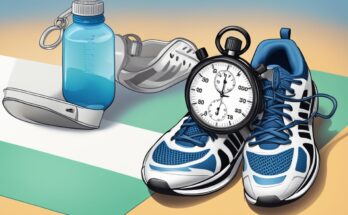Excessive sweating during a workout can be uncomfortable and embarrassing. Whether it’s running, jogging, or any other form of exercise, sweating is a natural response to an increase in body temperature. However, some people sweat more than others, and it can be frustrating to feel like you’re drenched in sweat while your workout partner stays relatively dry.
There are many factors that can contribute to excessive sweating during a run. One of the most significant is the temperature and humidity of the environment. When it’s hot and humid outside, the body has a harder time regulating its temperature, and sweating is the body’s way of cooling down. Additionally, some people are simply more prone to sweating due to genetics or their fitness level.
While sweating is a natural and necessary bodily function, excessive sweating can be a sign of a medical condition called hyperhidrosis. In these cases, sweating is not related to temperature or exercise and can occur at any time. If excessive sweating is interfering with your daily life, it’s important to speak with a healthcare provider to explore treatment options.
Why Do I Sweat So Much During My Run?
Sweat Glands and Body Temperature Regulation
Sweating is the body’s natural way of regulating its temperature. When the body gets too hot, sweat glands release sweat onto the skin’s surface, which cools the body down as it evaporates. The number of sweat glands a person has can vary, with some people having more sweat glands than others. This can affect how much a person sweats during exercise.
Environmental Factors
The environment can also play a role in how much a person sweats during a run. Humidity, for example, can make it harder for sweat to evaporate, which can cause a person to sweat more. Similarly, high temperatures can cause the body to sweat more as it tries to regulate its temperature.
Genetics
Genetics can also play a role in how much a person sweats during exercise. Some people are simply predisposed to sweating more than others due to their genetic makeup. This can be influenced by factors such as the number of sweat glands a person has, as well as the size and activity of those glands.
Fitness Level
A person’s fitness level can also impact how much they sweat during exercise. As a person becomes more fit, their body becomes more efficient at regulating its temperature, which can result in less sweating overall. However, during intense exercise, even fit individuals may still sweat heavily as their body works to cool down.
Overall, there are several factors that can contribute to why a person may sweat more during their run. By understanding these factors, individuals can take steps to help manage their sweat levels and stay comfortable during exercise.
How Does Excessive Sweating Affect My Workout?
Hydration and Fluid Balance
When someone sweats excessively during a workout, they lose a significant amount of fluids from their body. This can lead to dehydration, which can cause fatigue, headaches, and muscle cramps. It is important to drink enough fluids before, during, and after a workout to maintain proper hydration levels.
Overheating and Heat Exhaustion
Excessive sweating can also lead to overheating and heat exhaustion. When the body loses too much fluid through sweat, it can’t regulate its internal temperature as effectively. This can cause the body to overheat, which can lead to symptoms such as dizziness, nausea, and even fainting. It is important to take breaks and rest in a cool area if you start to feel overheated during a workout.
Sweat Rates and Electrolytes
Sweat rates and electrolyte imbalances are also important factors to consider when dealing with excessive sweating during a workout. Electrolytes such as sodium, potassium, and chloride are lost through sweat, and it is important to replenish them to maintain proper fluid balance in the body. Drinking sports drinks or eating foods high in electrolytes can help prevent imbalances.
Overall, excessive sweating during a workout can have negative effects on hydration, internal temperature regulation, and electrolyte balance. It is important to take steps to prevent dehydration and overheating by drinking enough fluids and taking breaks when necessary.
What Can I Do to Reduce Excessive Sweating During My Run?
Excessive sweating during a run can be uncomfortable and embarrassing. Fortunately, there are several things you can do to reduce excessive sweating during your run.
Antiperspirants and Deodorants
One way to reduce excessive sweating during a run is to use antiperspirants and deodorants. Antiperspirants work by blocking the sweat glands, while deodorants mask the odor of sweat. Look for antiperspirants and deodorants that are specifically designed for athletes and offer long-lasting protection.
Breathable Fabrics and Clothing
Another way to reduce excessive sweating during a run is to wear breathable fabrics and clothing. Breathable fabrics, such as cotton, allow air to circulate and wick away sweat, keeping you cool and dry. Look for clothing that is specifically designed for athletic activities and made from breathable materials.
Hydration and Cooling Techniques
Staying hydrated is important for reducing excessive sweating during a run. Drinking water before, during, and after your run can help keep you cool and prevent excessive sweating. You can also use cooling techniques, such as applying a cold compress to your forehead or neck, to reduce your body temperature and prevent excessive sweating.
In summary, reducing excessive sweating during a run can be achieved through the use of antiperspirants and deodorants, wearing breathable fabrics and clothing, and staying hydrated. By following these tips, you can stay cool and comfortable during your run.
When Should I Seek Medical Treatment for Excessive Sweating?
Excessive sweating during exercise is common, but sometimes it can be a sign of a more serious medical condition. It’s important to know when to seek medical treatment for excessive sweating. Here are some guidelines:
Hyperhidrosis and Botox Injections
Hyperhidrosis is a medical condition that causes excessive sweating. It can affect the entire body or just certain areas, such as the underarms, palms, or soles of the feet. Botox injections can be used to treat hyperhidrosis. Botox is injected into the affected area, such as the underarms, and it works by blocking the nerves that stimulate sweat production. The effects of Botox injections can last for several months.
Other Medical Treatments
There are other medical treatments available for excessive sweating, such as prescription antiperspirants, oral medications, and surgery. Prescription antiperspirants contain aluminum chloride, which can help reduce sweating. Oral medications, such as anticholinergics, can also help reduce sweating. Surgery may be an option for severe cases of hyperhidrosis.
Side Effects
All medical treatments have potential side effects, and it’s important to discuss these with your doctor. Botox injections can cause temporary pain, swelling, and bruising at the injection site. Prescription antiperspirants can cause skin irritation. Oral medications can cause dry mouth, blurred vision, and constipation. Surgery can cause complications, such as infection and nerve damage.
In conclusion, if excessive sweating is affecting your daily life, you should talk to your doctor. Your doctor can help determine the cause of your excessive sweating and recommend appropriate treatment options.
Conclusion
Excessive sweating during a run can be a frustrating and uncomfortable experience, but it is also a common and natural response of the body to regulate its temperature. While some people may sweat more than others, there are a few things that anyone can do to manage excessive sweating during a run.
Firstly, wearing breathable and moisture-wicking clothing can help to keep the body dry and cool. Secondly, staying hydrated before, during, and after a run is essential to replenish the fluids lost through sweating. Thirdly, avoiding caffeine and spicy foods before a run can help to reduce sweating.
It is also important to recognize that excessive sweating can be a symptom of an underlying medical condition, such as hyperhidrosis. If excessive sweating is a persistent problem, it may be worth consulting a doctor to rule out any underlying health issues.
Overall, managing excessive sweating during a run requires a combination of proper hydration, clothing, and potentially seeking medical advice. By taking these steps, runners can enjoy a more comfortable and enjoyable running experience.




